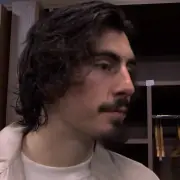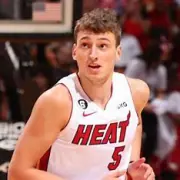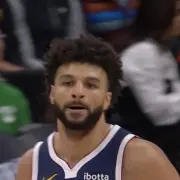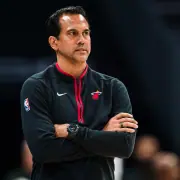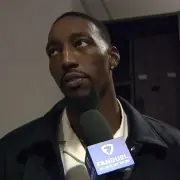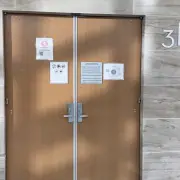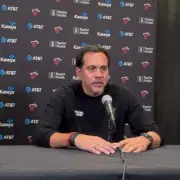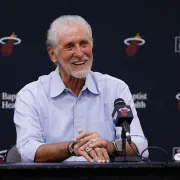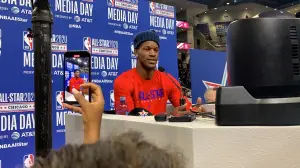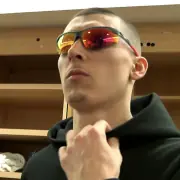Mateo’s Hoop Diary: The Heat escaped Utah with a close win and got payback for the slaughter on Jan. 4
The Heat got payback at the Delta Center for the massacre suffered on Jan. 4. Tyler Herro and Jaime Jaquez Jr. lit up the perimeter with seven of 14 3-pointers. And it was a low-scoring affair that featured 12 ties and 10 lead changes.
This was Jimmy Butler’s fourth game suspended of seven for conduct detrimental to the team.
“When I drive in the paint, and I draw two, it makes it really easy to spray out to shooters,” Jaquez said in the locker room after the game.
The offense started in the mud, making six of 22 shots. Nikola Jović was the lone Heatle to log multiple field goals in the first quarter on a trey and putback. But more problematically, they had allowed Lauri Markkanen to make two 3-pointers and score on a rim roll, plus let Collin Sexton rattle off four of five shots.
The second quarter started with the Heat down 27-20. Subsequently, the defense shut down the Jazz to 14 points on 20% shooting. On top of that, Herro made two layups and a 3-pointer.
At halftime, the Heat led 46-41. They had 12 paint points, nine on the break, four via second chances and nine off turnovers.
The Jazz had 16 paint points, seven on the break, five via second chances and 12 off turnovers.
.
Then the Heat started the third quarter on a 10-4 run, forcing a Jazz timeout. When play continued, Markkanen responded with three treys, and Sexton plus Isaiah Collier dribbled into the lane for layups. And the Heat’s offense stalled, making five of 20 shots for the remaining eight minutes of the frame.
The fourth quarter started with the Heat down 70-68. Despite shooting 33.3% from deep in the period, they took control because they were the first to loose balls and held the Jazz to one of eight 3-pointers. Furthermore, Herro plus Terry Rozier made five baskets from long and close range, and Jaime Jaquez Jr. scored six points.
The Heat won 97-92. They had 34 paint points, 17 on the break, 16 via second chances and 15 off turnovers.
The Jazz had 42 paint points, seven on the break, 11 via second chances and 18 off turnovers.
After the game, coach Erik Spoelstra said it was “ugly, not a shootout.” He also said Adebayo made big plays down the stretch.
The Heat will not practice on Friday.
Observations:
- In spite of an inaccurate night for Jović, he still was impactful as a distributor, racking up five assists and one turnover.
- Jaime Jaquez Jr. had his best game of the season. He was a threat on the break and made three of four 3-pointers, including the dagger to put the Heat ahead by five with a minute left. Additionally, he had seven dimes, his second-highest assist total of the season. After the game, Spoelstra said JJJ was good defensively against the Jazz and his performances have contributed to wins. He also had 20 points on seven of 11 shots with seven rebounds, two steals and three turnovers.
- Kel’el Ware gave good minutes off the bench. He made four of five shots via rim rolls and a putback in transition. He also denied Markkanen as the drop defender in pick and roll and as a helping low man.
- When the game was tied at 86 with three minutes left, Adebayo made a mid-range jumper and an eight-foot floater to take the lead.
- The Heat’s offense operated in the half-court 78.2% of the time. They scored 91.9 points per 100 plays, good enough for the 34th percentile of the stat, per Cleaning the Glass.
—
For more info on the Heat, subscribe to Off The Floor.
